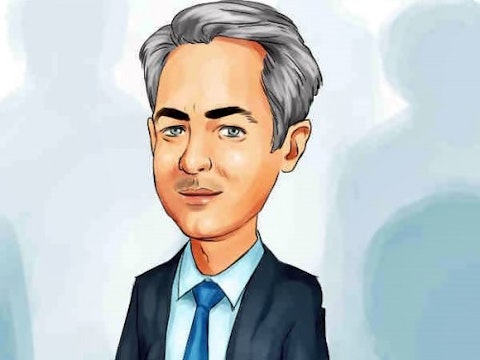Ackman’s Exit Sends Valeant Shares To More Than 7-Year Low (CNBC)
Shares of Valeant Pharmaceuticals dropped Tuesday after news surfaced late Monday that billionaire hedge fund manager Bill Ackman sold his remaining stock in the company. Valeant’s U.S.-traded shares closed the day down more than 10 percent, at less than $11 a share and a level not seen since May 2009 during the financial crisis. Sources told CNBC on Monday that Ackman sold his 27.2 million shares in Valeant at around $11 each. Ackman’s Pershing Square Capital Management had purchased the stock at an average cost of $196 a share in 2015, according to the hedge fund’s 2016 letter. Ackman then told CNBC that he sold his stake because it wouldn’t “move the needle for Pershing Square, even if the stock doubled from here.”

Paul Singer Is Reopening His Flagship Hedge Fund To New Capital (Bloomberg)
Billionaire Paul Singer is reopening his hedge fund to additional cash to take advantage of upcoming investment opportunities, according to people familiar with the matter. Investors will be able to start committing their money to the multistrategy hedge fund in the second quarter, said one of the people, who asked not to be identified because the information isn’t public. The capital may be put to work within two to three years. Singer’s $32.8 billion Elliott Management raises money by securing commitments from investors and calling on that capital at a later date when the opportunity is ripe.
Och-Ziff Executives Said To Leave After $13 Billion Withdrawn (Bloomberg)
Several executives are leaving Och-Ziff Capital Management Group LLC after the hedge fund suffered withdrawals of about $13 billion in the past 13 months and its shares dropped, according to people with knowledge of the matter. Among those departing are Drew Gillanders, a top European equity analyst; James Keith “JK” Brown, a partner and head of investor relations; and Paula Drake, chief compliance officer, said the people, who asked not to be identified discussing personnel matters. Hamish Chalmers, an analyst in London, also has exited, they said. Drake declined to comment, while none of the others leaving returned calls and emails seeking comment. Och-Ziff, one of the biggest hedge-fund managers, has seen its assets decline amid middling performance and a five-year probe into a unit that pleaded guilty to conspiring to bribe government officials in the Congo to win business.
Brett Icahn Finally Earns His Father’s Love (DealBreaker)
Forbes’ annual list of the 25 hedge fund managers who made the most money last year is out, and once again it’s topped by a guy who doesn’t technically run a hedge fund anymore: Renaissance Technologies founder James Simons, who retired eight years ago, still made $1.5 billion last year, good enough for a first-place tie with BlueCrest Capital Management’s Michael Platt. The two guys who actually run RenTech, Peter Brown and Bob Mercer (the latter when he’s not busy harming the country), had to settle for $125 million apiece and sharing 25th place on the list. Simons’ triumph means that, in three of the last four years, the highest-earning hedge fund manager hasn’t been a hedge fund manager at all: The equally-retired George Soros topped the list in 2013 with an impressive $4 billion haul, and the forcibly-retired-for-the-time-being Steve Cohen brought home $1.3 billion in 2014, the year he became head of a family office.
How A Big Hedge Fund Ace Lost 95% (Forbes)
One of the biggest hedge fund managers, Bill Ackman, considered to be one of brightest, lost over 95% in one of his largest positions, Valeant Pharmaceuticals (VRX). He held the stock for about three years during which time the stock plunged from $257 to $11 on March 14, 2017. On March 13, he declared he had sold his entire position in Valeant. When Ackman initially got into the stock, he saw that he had possibly made a big mistake. He had a choice, get out of the VRX or try to fix the company. He did the latter, which turned out to be a big mistake. Yes, even the smartest people make big mistakes.
The Hits Keep Coming For Anthony Scaramucci (DealBreaker)
Unless he can convince President Trump that his ethical encumbrances wouldn’t keep him from serving as a wonderful ambassador to San Marino or Kyrgyzstan or Equitorial Guinea, the Mooch is going to be humiliated, unemployed and facing a massive and unanticipated tax bill. With the sale expected to close in roughly 30 days, that gives the hedge fund executive, affectionately known as The Mooch, roughly 90 days to get a Trump administration job – or face a tax bill possibly millions of dollars higher than expected, sources said. “If he doesn’t get a job, he’ll have lost his business and be subject to tens of millions in taxes,” a source close to the situation said.
Meet The 8 Hedge Fund Managers Who Made The Most Money In 2016 (Business Insider)
It’s no secret that hedge funds have not been doing well. 2016 was an especially rough year for the once mighty kings of Wall Street. High fees and lackluster returns have forced many investors to pull their money out of hedge funds. The $3 trillion industry shrunk by about $70 billion last year, the biggest drop since 2009, according to data tracker HFR. But that doesn’t mean that hedge fund managers, long known to be some of the wealthiest people on Wall Street, are on their way to the poor house. Forbes has just released its list of the highest-earning hedge fund managers and traders of 2016. And it shows that top hedge funders are doing just fine when it comes to their take home pay.
Activist Hedge Fund Critical Of Walt Disney’s Move On Disneyland Paris (Reuters)
An activist hedge fund has criticised plans by Walt Disney to take full control of debt-laden Paris theme park operator Euro Disney, according to a letter seen by Reuters. Paris-based CIAM, which owns 1.4 percent of Euro Disney shares, has written to the board of the French company to object to what it believes are plans by Walt Disney to force out minority shareholders. It said it has the support of more than 5 percent of Euro Disney shareholders, including its holding. “The Walt Disney Company seeks to force out the remaining minority shareholders by offering them a new public offer, under penalty of having to undergo a strong dilution later,” said the letter, dated March 6.
Hedge Fund Sees 30% Gain By Betting Only On Tomorrow, Literally (Bloomberg)
This hedge fund is only looking one day ahead. That delivered a 30 percent return in 2016 for the London-based Runestone Capital Fund, which crunched more than 700 variables to develop a quantitative model for trading U.S. equity index volatility. “We trade with a one-day horizon as predicting volatility long term is completely random,” Rune Madsen, founder and portfolio manager of the $17 million fund, said in an interview on Monday. The absolute return fund, which targets an average annual return of more than 20 percent, is always directional, making bets that one-day volatility will either rise or fall, according to Madsen. The return for 2016 was 30 percent with a maximum loss from peak to trough of 5.2 percent.





